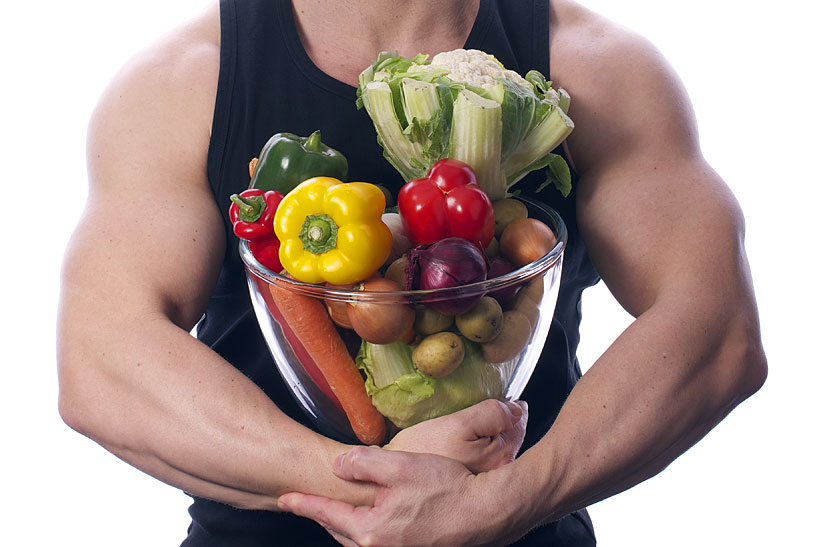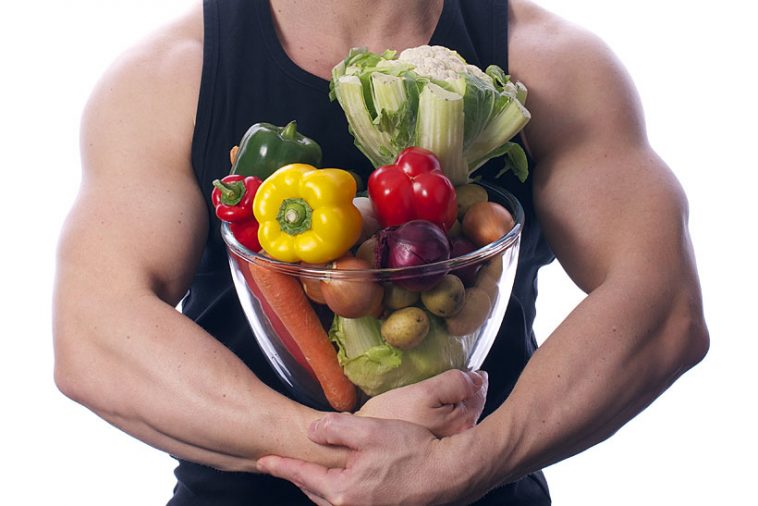- Like
- SHARE
- Digg
- Del
- Tumblr
- VKontakte
- Flattr
- Buffer
- Love This
- Save
- Odnoklassniki
- Meneame
- Blogger
- Amazon
- Yahoo Mail
- Gmail
- AOL
- Newsvine
- HackerNews
- Evernote
- MySpace
- Mail.ru
- Viadeo
- Line
- Comments
- Yummly
- SMS
- Viber
- Telegram
- JOIN
- Skype
- Facebook Messenger
- Kakao
- LiveJournal
- Yammer
- Edgar
- Fintel
- Mix
- Instapaper
- Copy Link
 Conventional wisdom in bodybuilding says that to see the best results from your time spent in the gym you should consume large amounts of animal protein, but what does this mean for vegans?
Conventional wisdom in bodybuilding says that to see the best results from your time spent in the gym you should consume large amounts of animal protein, but what does this mean for vegans?
Well, it turns out that there is more than one path towards making gains. In fact, many bodybuilders have packed on copious amounts of muscle while following a plant-based diet. Although meat is a go-to protein source for many people, it is not the only one. Protein can be derived from tofu, vegetables, and other sources.
It is worth noting that protein from sources other than meat may not be enough to increase muscle mass significantly. As such, many vegan bodybuilders will consume shakes made with vegan protein powder to help them meet their protein goals.
In this article, we will take a closer a look at what being a vegan bodybuilder entails and why it is becoming a new trend in the fitness community.
Why a Plant-Based Diet is a Healthier Alternative
There is no denying that red meat is chock-full of protein, but it is also high in saturated fat that can raise one’s cholesterol too. Studies have also shown that there is a strong link between red meat and heart disease, not to mention colorectal cancer. So while you may be able to gain muscle mass, consuming large amounts of red meat may jeopardize your overall health. That said, more and more people are turning to a plant-based diet to improve their health and to build muscle at the same time.
How To Increase Muscle Size on a Plant-Based Diet
Having already established that a vegan diet is a healthier alternative to a traditional diet, let’s take a moment to discuss the process of packing on size as a vegan.
Carbohydrates
Whether you’re a carnivore, vegetarian, or vegan, carbohydrates are still necessary for building muscle. As a vegan, however, you should aim to consume low-glycemic carbohydrates whenever possible as they are far healthier than their refined counterparts. Good carb sources include oatmeal, barley, whole grain bread, and black beans, for example. In addition to keeping you satiated, these foods are also chock-full of fiber to help keep you regular.
Increase Your Caloric Intake
If your goal is to increase size, you have to consume a surplus of calories. This general truth applies to vegans and non-vegan bodybuilders alike. Following a traditional vegan diet generally means you don’t consume as many calories as those who eat meat. To avoid catabolism, you will need to consume enough calories to not only preserve the muscle you have but also to avoid losing the muscle you already have.
Omega-3 Fatty Acids
As a vegan, you obviously will not be able to get omega-3 fatty acids through animal protein like sardines and salmon, for example. However, these nutrients are still an essential part of a healthy diet. Omega-3 fatty acids offer a plethora of health benefits can help lower cholesterol and reduce inflammation. In addition to animal protein, omega-3 fatty acids can also be found in olive oil and flaxseed. Also, they are a great source of protein, B vitamins, and fiber.
Supplementation is Critical for Vegans
While a plant-based diet is healthy, those who follow a strict vegan diet may find that they are not getting all of the vitamin and nutrients that they need. The best way to overcome this nutrient shortfall is by taking more supplements.
Some of the most common supplements taken by vegans include:
- Vitamin D
- Calcium
- Zinc
- Vitamin B12
- Iodine
- Calorie supplements
- Protein supplements
Eating Multiple Small Meals
The best way to stay satisfied longer and increase muscle size is to eat multiple small meals throughout the day. Although some may argue that doing so would leave you feeling hungry, a series of smaller meals ensures that you get a healthy flow of nutrients without the hours of fasting in-between meals, which is what happens when you only eat three times per day.
Healthy Drinks
In addition to good plant-based foods, it is also a good idea to consume drinks that are not only refreshing but also delicious. For example, fruit smoothies can be a perfect mid-day snack or a meal unto itself. In addition, light drinks like green tea or non-sparkling water, for example, can be a great way to rehydrate.
Eating Before a Workout
Whether you’re a hardcore gym enthusiast or just workout on occasion, it is always a good idea to fuel your body with nutrient-dense foods before a workout. All too often we become so consumed with planning exercise that targets certain muscle groups that we lose sight of the importance of having enough energy to get through a gym routine. That said, consider taking a moment to indulge in a smoothie, oatmeal, or sandwich before hitting the iron or starting your next cardio session.
The Bottom Line
Obviously, there are some key differences between building muscle as a vegan and building muscle as a non-vegan; however, there are also many similarities. Either way, you still need to consume a healthy diet and work hard. While bodybuilding as a vegan does present some challenges, it is possible to achieve the perfect physique without jeopardizing your health in the process.
About Jason Spencer
Jason Spencer has a tremendous enthusiasm for all facets of health, fitness and physical performance that stems from an athletic lifestyle from childhood. Jason was fortunate enough to compete in collegiate football and learned to love the challenges that physical activity placed on the body. As Jason progressed through his higher education and became increasingly aware of how science is applied to physical activity and how it reveals the benefits of exercise, he realized very quickly that he wanted to pursue a career that gives him the opportunity to teach others to compete, challenge, and push themselves towards something more valuable to them than anything else; health, fitness and self worth. Being a fitness professional allows Jason to do this for them and he is always incredibly grateful for that. Jason has a Bachelor of Science degree in Neuroscience from Muhlenberg College in Allentown, PA. Neuroscience and his acquired knowledge of the nervous system and muscle stimulation techniques has been extremely instrumental towards building a unique ability and feel for training the body for optimal form and function. As a personal trainer he is certified with ACSM (American College of Sports Medicine). He's also a strength & conditioning specialist with NSCA (National Strength & Conditioning Association). He has additional certifications in both kettlebell principles & techniques (Equinox), and Flexibility & Corrective Exercise (Swedish Institute of Health Sciences in NY). Jason has worked as a trainer and conditioning specialist in a variety of fitness facilities over the years such as: LA Fitness in Piscataway, NJ, the YMCA in Metuchen, NJ, and Equinox Fitness Clubs in New York, NY. He also does private in-home sessions all over the Manhattan area.

